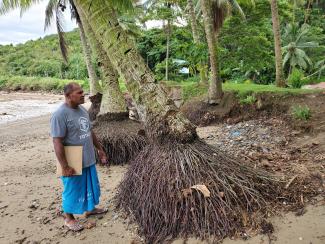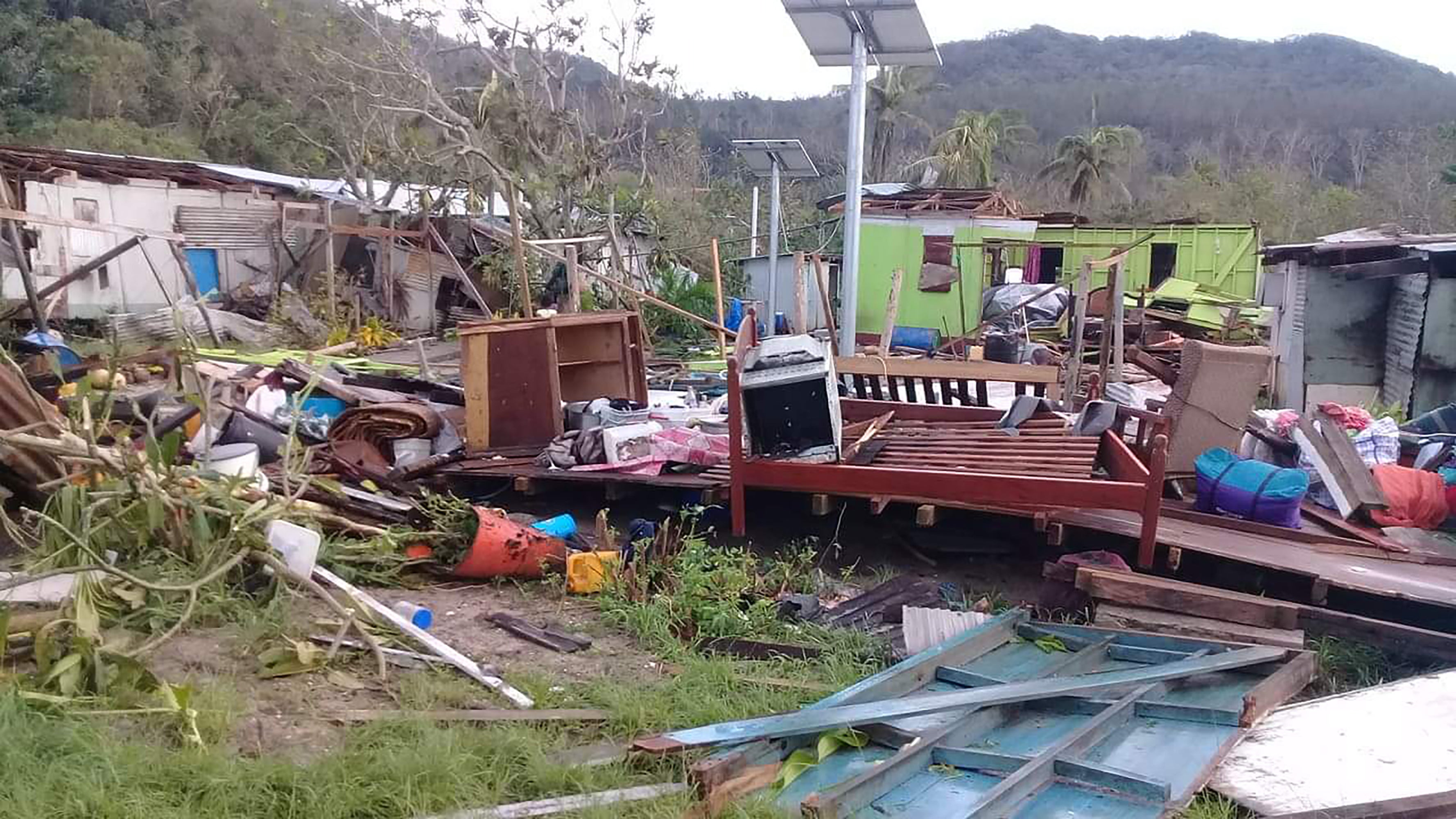
Josevata Nagasaukula standing on Namatakula’s rapidly eroding shoreline. Photo by Salote Soqo.
Josevata Nagasaukula and I walk along the western shoreline of his village, Namatakula. The village sits roughly 54 miles southwest of Fiji’s capital city of Suva and is home to approximately 2,500 people and it is at risk of experiencing a health emergency. “The neighboring province was hit most by the disease,” he says in his native dialect as we walk to the village. “We are fortunate that we were not as badly affected.” Nagasaukula was not referring to COVID-19 in this case. He was talking about the measles outbreak in the neighboring provinces of Serua and Namosi. In November 2019, the outbreak was declared a national epidemic in Fiji. The World Health Organization (WHO) warns that a measles outbreak in a country experiencing conflict or natural disaster could be fatal.
Epidemics like these aren’t restricted to Fiji. The Pacific island nations of Samoa, Tuvalu, Kiribati, Papua New Guinea, and the Marshall Islands are also managing a host of viral outbreaks including measles and dengue fever and, most recently, COVID-19. The coronavirus was first casually referenced in the Pacific media in early February. The virus was yet to be named and appeared to solely affect China, Italy, and cruise ships in Japan. By early March, Tuvalu, a sovereign nation of eight atoll islands, implemented a policy to prevent the introduction of COVID-19 into the population of approximately 10,000 people. That same week, the Marshall Islands, with about 53,000 residents, suspended all international flights to and from the country. To protect its roughly 300 islands with a combined population of 900,000 people, the Fijian government monitored all visitors and prepared to limit, and eventually ground, all international flights. In early April, Pacific island leaders invoked a regional mechanism, the Biketawa Declaration, establishing a humanitarian process for the nations to collectively respond to the pandemic.
COVID-19, measles, and dengue fever are not the only risks the Pacific islands face. These island nations collectively emit less than one percent of the world’s greenhouse gas emissions, yet they disproportionately experience the impacts of the climate crisis. There are 20 sovereign island nations in the Pacific, with between 20,000-30,000 islands covering more than 16 million square miles of the Pacific Ocean. The region possesses one of the world’s richest biodiversities and unique cultures, with more than 1,500 Indigenous spoken languages. Papua New Guinea alone is home to well over 800 Indigenous languages, more than most other countries in the world. The remoteness of this constellation of islands within the southern hemisphere puts the region at a distinct advantage over COVID-19. However, relatively small land masses with growing populations heighten the region’s susceptibility to the multiplicative effects of the measles and dengue fever epidemics, the COVID-19 pandemic, and the brutal impacts of climate change.

Damages sustained by Narikoso Village, Kadavu, in Fiji. Photo by Kelepi Saukitoga.
Limited infrastructure, sensitive ecosystems, increased land degradation, and a reliance on natural resources for economic livelihoods put the island nations at further risk. Rising ocean temperatures and sea levels, and intensifying natural disasters present serious concerns for many communities, particularly those experiencing economic and social hardships. Subsistence farmers and fisherfolk, rural villagers with limited access to resources, women, children, and people with disabilities are at risk during times of uncertainty. “These already stressful situations, combined with the onslaught of a severe natural disaster, will no doubt create another layer of injustice for already marginalized groups within our society,” said Fenton Lutunatabua, regional managing director for 350.org, a local advisor to the Unitarian Universalist Service Committee (UUSC). “It’s important to remember now that we need to continue to put people’s health and well being first and foremost, especially in how we recover from this to create stronger communities and build solidarity across borders.”
In the midst of the pandemic, Tropical Cyclone Harold, a Category 5 storm, descended on the region, uprooting vegetation, homes, and communities. Left to live in debris, survivors were deprived of food and clean water. Like other natural disasters, people congregated in evacuation centers and communal shelters for safety, a decision weighed successfully against social distancing recommendations. According to reports, about 30 lives were lost. COVID-19 measures implemented to halt the spread of the virus, such as restricting ferry transport between islands, the grounding of international flights, and the dismissal of foreign aid workers, made the supply and provision of relief and recovery aid challenging, leaving affected communities in dire situations. In the past five years, the Pacific has experienced two other deadly Category 5 cyclones: Cyclone Pam in 2015 and Cyclone Winston in 2016. Cyclone Winston is the strongest cyclone on record to make landfall in the southern hemisphere.
This narrative reflects a fraction of the issues the UUSC’s partners face at the grassroots level, where various ongoing risks and historical traumas intersect and are acutely felt. In Tuvalu, the Tuvalu Climate Action Network (TuCAN), consisting of grassroots community leaders, are working to engage communities throughout its eight islands about the inevitable risks of displacement and the sensitive decision of whether or not to migrate. This work is being done as sea level rise continues to flood homes and deplete limited resources. Within their respective communities, our partners work diligently to protect their cultural practices and traditions, harnessing their values to adapt in place. In the Marshall Islands, the Marshall Islands Conservation Society provides community leaders with scientific tools to inform decisions around relocation and policy advocacy, while also battling food and water scarcity, flooding, and the impacts of nuclear testing. In Fiji, where 63 communities have been identified by the government as needing to relocate due to climate change impacts, our partner, Social Empowerment Education Programme (SEEP), is organizing several of these communities to support the creation of relocation policies while also raising awareness about COVID-19 in rural areas. Recognizing, respecting, and promoting traditional and cultural rights is threaded throughout all of this work. The confluence of these crises is undeniably disastrous. However, I have witnessed the resolve of our partners and the Pacific community to chart their own path, act, and adapt. They exude courage and strength and remind me that they are steadfast and will continue their important work. The resourcefulness and adaptability of our partners in the Pacific is what makes our partners unique and truly inspiring. They represent and serve the communities who have fought and continue to fight threats to their survival. The issues they face may vary, but they share one story and the critical mandate of honoring our shared humanity and human dignities, particularly during this difficult time. My infant son accompanied me on my trip to Fiji. It was his maiden trip home, a journey connecting his body and spirit with his ancestral lands. My mother wrapped my son with masi, a traditional cloth, and laid him on an arrangement of ancestral mats to welcome him home. This profound cultural practice, unique to the region, is not only a demonstration of unwavering love, but a radical act of resistance and survival as the Pacific recovers her people and land.
—Salote Soqo is senior partnership officer for Climate Justice and Crisis Response for the Unitarian Universalist Service Committee. She is a native of Fiji.
This article was written in collaboration with the Unitarian Universalist Service Committee as part of a series highlighting the resilience, wisdom, and power of Indigenous communities as they face the climate crisis.
To read One Story: A Report of the First Peoples Convening on Climate-Forced Displacement, visit tinyurl.com/ydyq5jtw.
